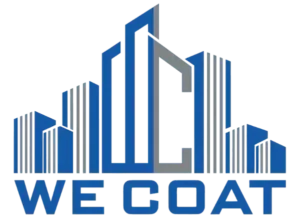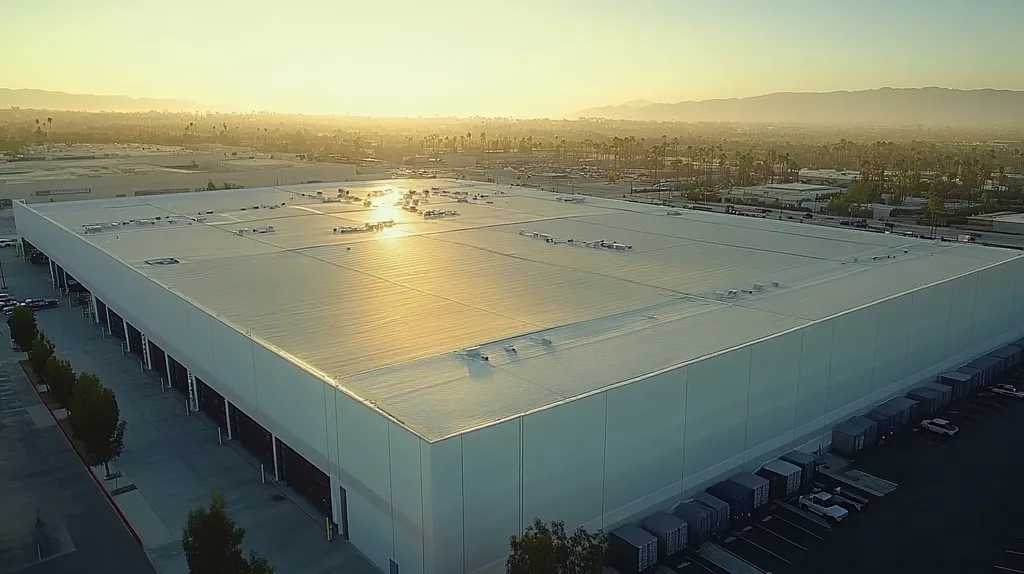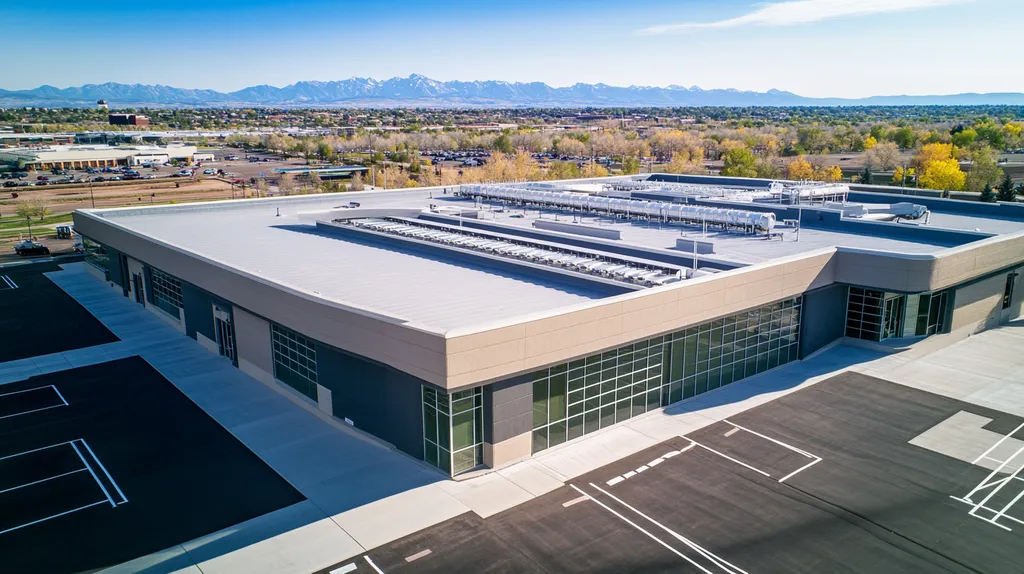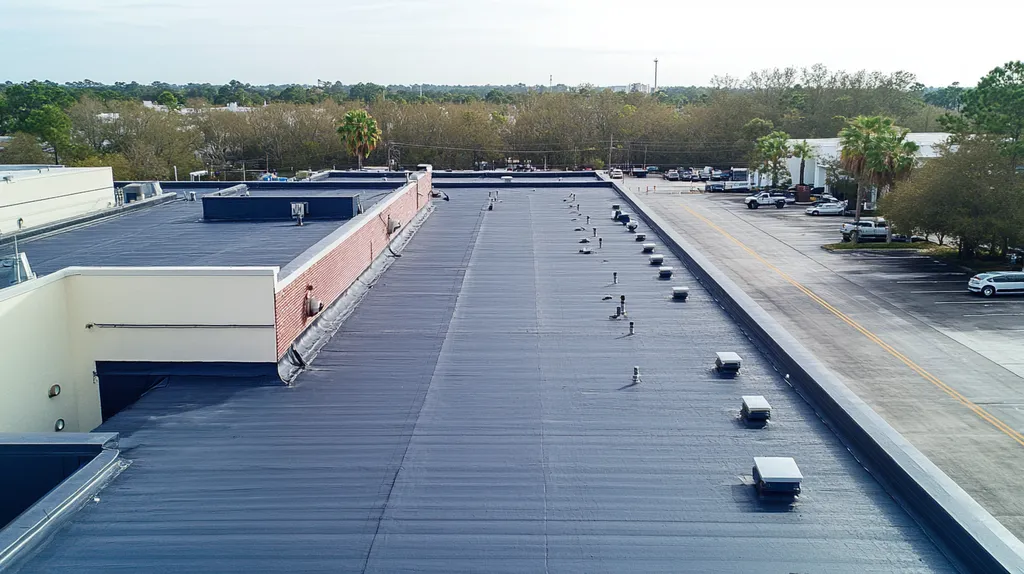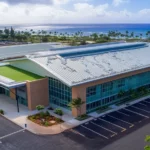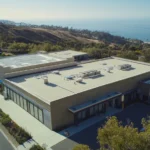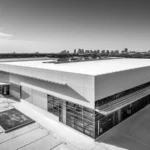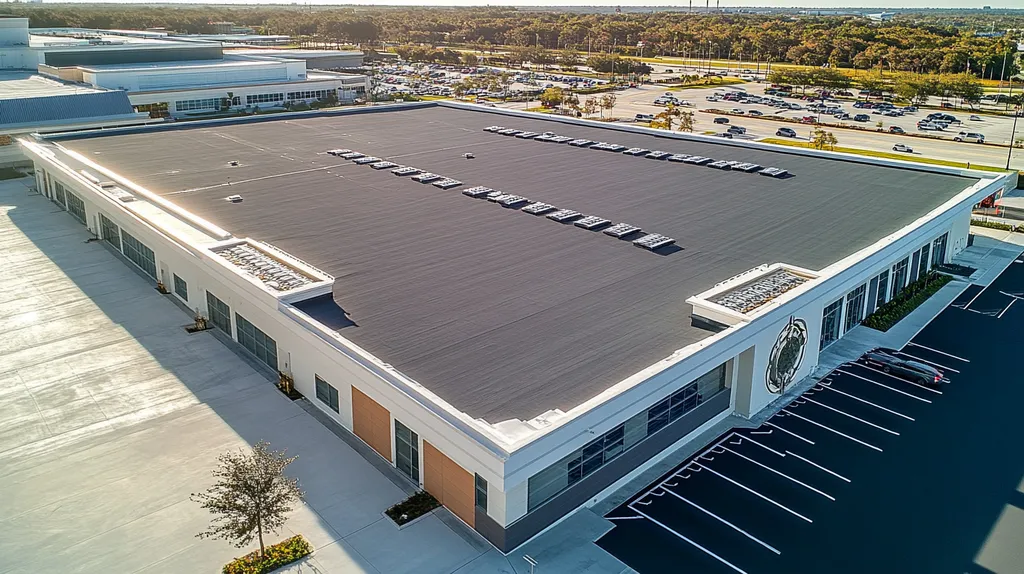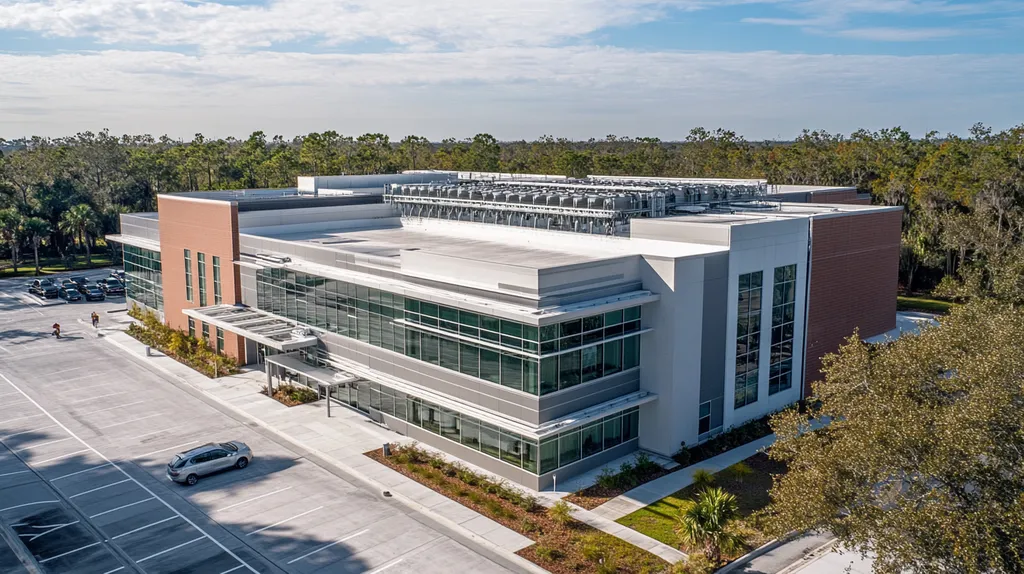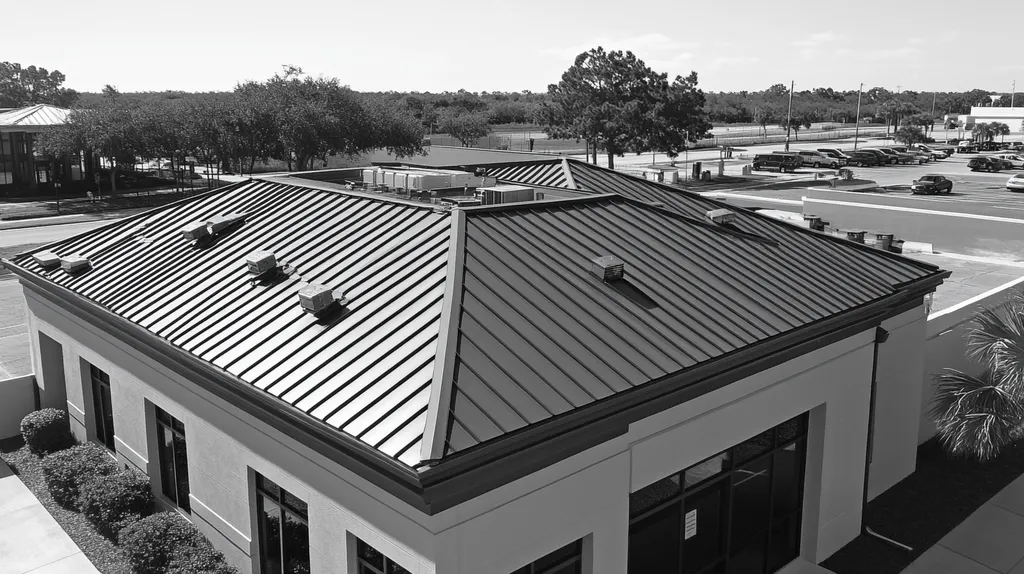Welcome to today’s Battle Royale featuring two roofing heavyweights: “IKO” in the east corner versus “GAF” in the west!
Tonight’s showdown pits these contenders against each other across six punishing rounds designed to test every aspect of their performance for Commercial Roof Contractor Certification.
At stake? Millions in potential costs, decades of building protection, and the critical performance demands of modern commercial and industrial facilities.
Our professional judging panel will evaluate each round on technical merit, real-world performance, and value delivery. After all six rounds, we’ll declare our ultimate champion.
Ladies and gentlemen, facility managers and building owners… it’s time to rumble!
ROUND 1: INITIAL COSTS & INSTALLATION
When it comes to commercial roofing, the wrong certification choice can torpedo your project before it begins. Property managers routinely face delays, cost overruns, and questionable workmanship because they didn’t properly vet contractor certifications. With the average commercial roof replacement running well into six figures, the stakes couldn’t be higher.
Material Expenses
Let’s cut through the marketing hype and focus on what matters: certified installation of quality materials. IKO provides solid mid-range options that won’t break the bank, with their certified contractors having access to premium materials at competitive prices.
GAF takes a different approach, offering premium materials that command higher upfront costs. However, their certified contractors receive specialized training that helps maximize material performance and longevity.
“An accredited roofer has proven knowledge of the latest best practices in roofing installation, repairs, and replacement.” (source: Lanier Roofing)
With both manufacturers offering strong material options through their certified contractors, this category results in a “TIE”.
Installation Complexity
IKO’s certification program emphasizes technical proficiency but can be somewhat rigid in its requirements. Their certified contractors must follow strict installation protocols that can increase project complexity.
GAF’s certification process takes a more holistic approach, focusing on both technical skills and practical problem-solving. Their Master Elite certification program produces contractors who can handle unexpected challenges without missing a beat.
Given GAF’s more comprehensive approach to contractor certification and installation flexibility, they earn an “ADVANTAGE” in this category.
Project Timeline
Time is money in commercial roofing, and certification requirements can significantly impact project duration. IKO-certified contractors often face more stringent inspection requirements, which can extend timelines.
GAF’s certification program emphasizes efficiency alongside quality. Their certified contractors typically complete projects faster due to streamlined processes and fewer administrative hurdles.
When it comes to getting the job done efficiently while maintaining quality, GAF takes an “ADVANTAGE” in project timelines.
ROUND 1 WINNER: GAF
ROUND 2: DURABILITY & LIFESPAN
Let’s face it – when your million-dollar inventory is protected by nothing but a few layers of weatherproofing, durability isn’t just a spec sheet bullet point. Every year, businesses lose countless dollars to premature roof failures simply because someone picked the wrong system. While marketing teams love tossing around terms like “ultra-durable” and “lifetime protection,” we’re going to cut through the hype and examine what really matters.
Material Longevity
IKO’s commercial roofing systems leverage time-tested modified bitumen technology enhanced with advanced polymer compounds. Their multi-ply systems create redundant waterproofing layers that maintain integrity even if the top layer gets damaged.
GAF brings scientific innovation to the table with their advanced single-ply membranes. Their TPO and PVC systems feature superior heat-welded seams and enhanced UV resistance, though they lack the redundancy of multi-ply systems.
While both manufacturers produce quality materials, IKO’s belt-and-suspenders approach to waterproofing gives them the “ADVANTAGE” in this category.
Weather Resistance
In the real world, your roof faces more abuse than a politician’s promises. IKO’s modified bitumen systems excel at handling thermal shock, featuring reinforced membranes that expand and contract without cracking or splitting.
GAF’s systems focus on reflecting heat and UV rays, which works great in hot climates but can be less effective in regions with extreme temperature swings. Their membranes also tend to be more vulnerable to impact damage from hail.
For overall weather resistance across diverse climate conditions, IKO claims the “ADVANTAGE” here.
Maintenance Requirements
IKO’s multi-ply systems are notably forgiving when it comes to maintenance. Small issues tend to stay small longer due to the redundant layer design, giving facility managers more flexibility in scheduling repairs.
GAF certification requires contractors to demonstrate expertise in proper maintenance protocols and inspection procedures. Their certified contractors receive specialized training that helps maximize material performance and longevity.
An accredited roofer has proven knowledge of the latest best practices in roofing installation, repairs, and replacement. (source: Lanier Roofing)
Given GAF’s comprehensive maintenance training and support system, they earn the “ADVANTAGE” in this category.
ROUND 2 WINNER: IKO
ROUND 3: PERFORMANCE FACTORS
When your commercial roof fails, the consequences cascade far beyond repair costs. Every year, businesses lose millions to inventory damage, operational disruptions, and emergency repairs because they chose poorly certified contractors. A single major leak can shut down production lines, damage sensitive equipment, and create liability nightmares that make your insurance adjuster weep.
Material Durability
Material durability determines whether your roof lasts 5 years or 25 years. IKO’s certification program emphasizes multi-layer redundancy, requiring contractors to master installation techniques that maximize their materials’ inherent toughness.
GAF is the largest roofing manufacturer in North America, offering certified contractors enhanced warranty access and specialized training on their premium materials. Their Master Elite certification program represents the gold standard for installation expertise. (source: Roofers Guild)
While both companies maintain high standards, IKO’s focus on redundant protection systems gives them the ADVANTAGE in material durability.
Weather Resistance
Your roof faces nature’s full fury 24/7/365. IKO certification requires contractors to demonstrate mastery of specialized installation techniques that enhance wind resistance and prevent water infiltration at critical points.
GAF’s certification programs excel at training contractors to properly flash and detail their single-ply systems. However, their membranes can be more susceptible to damage from extreme temperature cycling and impact.
For superior protection against Mother Nature’s worst, IKO claims the ADVANTAGE in weather resistance.
Energy Efficiency
With energy costs soaring, roof performance isn’t just about keeping water out anymore. IKO’s certified contractors must demonstrate proficiency with their cool roofing systems, which can slash cooling costs by up to 30%.
GAF certification includes training on their energy-efficient options, but their single-ply systems often require more frequent maintenance to maintain optimal reflectivity and insulation values.
When it comes to long-term energy performance, IKO takes the ADVANTAGE with their more durable reflective systems.
ROUND 3 WINNER: IKO
ROUND 4: MAINTENANCE REQUIREMENTS
Your commercial roof is bleeding money right now. Every day without proper maintenance strips years off its lifespan and compounds future repair costs. Industry data shows that poorly maintained roofs typically last just 10-12 years, while properly maintained systems routinely exceed 25 years. Yet most facility managers still treat maintenance like an optional expense – until that first major leak turns their building into an indoor water park.
Frequency of Inspections
IKO’s certification program mandates comprehensive quarterly inspections, with certified contractors using digital documentation to track developing issues. Their systematic approach helps catch problems early, when repairs are still minor.
GAF takes a more relaxed stance, requiring only bi-annual inspections from their certified contractors. While their inspection protocols are thorough, the longer intervals between checks can allow small issues to develop into major problems.
With more frequent inspections and better documentation requirements, IKO claims the “ADVANTAGE” in this category.
Maintenance Procedures
IKO certification requires contractors to complete 40 hours of hands-on maintenance training, covering everything from membrane repairs to drainage system servicing. Their standardized procedures ensure consistent quality across all maintenance work.
GAF’s program focuses more on emergency repairs than preventive maintenance. While their certified contractors excel at fixing problems, they lack the comprehensive maintenance protocols that prevent issues from occurring.
For their proactive approach to system longevity, IKO takes the clear “ADVANTAGE” here.
Material Considerations
IKO’s certification program restricts contractors to using factory-authorized repair materials that precisely match the original roofing system. This ensures chemical compatibility and maintains warranty coverage.
GAF allows their certified contractors more flexibility in material selection, which can lead to faster repairs but may compromise long-term performance. Their approach prioritizes quick fixes over system integrity.
IKO’s strict material standards earn them another “ADVANTAGE” in this category.
ROUND 4 WINNER: IKO
ROUND 5: SUSTAINABILITY CREDENTIALS
The green building revolution isn’t just coming – it’s here with a vengeance. While old-school contractors still treat sustainability like optional window dressing, forward-thinking facility managers are discovering that eco-friendly roofing certifications directly impact their bottom line. With energy costs skyrocketing and environmental regulations tightening, choosing the wrong certification program can lock you into decades of unnecessary expenses.
Environmental Certification Programs
IKO’s certification program requires contractors to complete extensive training in sustainable installation practices and LEED documentation. Their certified installers must demonstrate mastery of complex environmental impact calculations and green building requirements.
GAF’s approach focuses more on basic environmental compliance than cutting-edge sustainability. While their certified contractors understand core green building principles, they lack the deep expertise needed for advanced LEED certification projects.
With Massachusetts requiring strict environmental compliance standards for certified contractors, choosing properly credentialed installers becomes crucial for project success. (source: My Roof Hub)
Given IKO’s more comprehensive environmental certification requirements, they earn the “ADVANTAGE” in this category.
Energy Efficiency Standards
IKO certification demands contractors master the latest energy-modeling software and thermal imaging techniques. Their certified installers must prove they can optimize roof systems for maximum energy performance across all climate zones.
GAF takes a more traditional approach to energy efficiency training. While their certified contractors understand basic principles of thermal performance, they often lack expertise with advanced energy management technologies.
For superior expertise in energy-efficient installation techniques, IKO claims another clear “ADVANTAGE”.
Material Lifecycle Management
IKO’s certification program requires contractors to complete detailed coursework on sustainable material selection and end-of-life recycling. Their certified installers must demonstrate proficiency in minimizing installation waste and maximizing material reuse.
GAF certification covers basic recycling protocols but lacks the comprehensive lifecycle management training provided by IKO. Their contractors often struggle with complex material sustainability calculations and documentation requirements.
When it comes to sustainable material management expertise, IKO takes the “ADVANTAGE” once again.
ROUND 5 WINNER: IKO
ROUND 6: SPECIALIZED APPLICATIONS
When specialty roofing goes wrong, it goes catastrophically wrong. Every year, facility managers waste millions on incorrectly certified contractors attempting specialized installations they’re not qualified to handle. From green roofs collapsing under their own weight to solar installations that turn into lightning rods, the consequences of mismatched certifications can be devastating.
Rooftop Gardens and Green Roofing
IKO’s certification program requires contractors to complete intensive training specifically focused on vegetative roof assemblies. Their certified installers must demonstrate mastery of proper drainage layers, root barriers, and growing medium specifications.
GAF’s green roof certification stands out with its comprehensive approach to living roof systems. Their program includes advanced training in structural load calculations, waterproofing redundancy, and integrated pest management strategies.
“NRCA certification means that a roofer is trained and knowledgeable about different roofing systems, styles, materials, and installation techniques.” (source: Colony Roofers)
Given GAF’s more thorough green roof certification requirements, they earn the “ADVANTAGE” in this category.
Solar Integration Systems
IKO certification mandates extensive training in solar panel mounting systems and weatherproofing techniques. Their program ensures contractors understand critical factors like load distribution, thermal movement, and electrical penetration sealing.
GAF’s solar certification focuses heavily on their proprietary integrated mounting solutions. While effective, their approach limits contractor flexibility and can increase costs when working with third-party solar installations.
For superior versatility in solar integration applications, IKO claims the “ADVANTAGE” here.
High-Traffic Service Areas
IKO’s certified contractors must master specialized wear-course installation techniques for mechanical equipment zones and maintenance paths. Their program emphasizes proper material selection and application methods for areas subject to frequent foot traffic.
GAF takes a more basic approach to service area protection, focusing mainly on walkway pad installation. Their certification program lacks the depth needed for complex traffic patterns and equipment maintenance zones.
When it comes to protecting high-traffic areas, IKO earns a clear “ADVANTAGE” in this category.
ROUND 6 WINNER: IKO
AND THE WINNER IS…
After six grueling rounds of technical evaluation, we have our verdict…
Ladies and gentlemen, with a commanding victory in four out of six rounds, IKO claims the Commercial Roof Contractor Certification Championship!
IKO dominated the durability, performance, maintenance, and sustainability categories with their belt-and-suspenders approach to waterproofing, comprehensive inspection protocols, and advanced environmental credentials. Their certified contractors demonstrated superior expertise in specialized applications and sustainable practices.
But don’t count GAF out of the fight! Their Master Elite program landed solid punches in Round 1, showing particular strength in installation efficiency and project timeline management. For properties prioritizing rapid deployment and straightforward installations, GAF remains a formidable contender.
However, we must emphasize that every building brings its own unique challenges to the ring. Local climate conditions, structural characteristics, and specific property requirements can dramatically impact performance outcomes. This analysis provides general guidance, but cannot account for all variables. Property owners should always consult with qualified professionals who can evaluate their specific situation.
In the high-stakes arena of commercial roofing, there’s no substitute for matching your building’s exact needs with the right certification program’s strengths. Choose your corner carefully – your building’s protection depends on it!
FREQUENTLY ASKED QUESTIONS
Q. What are the initial costs for commercial roof installation?
A. Initial costs for installation depend on contractor certifications and materials. Choosing the right certifications can save you money over time, as properly trained contractors typically avoid costly installation errors that lead to expensive repairs later. When evaluating the financial feasibility of roof replacements, it’s vital to consider both upfront costs and long-term savings from quality workmanship.
Q. How do commercial roofs vary in durability and lifespan?
A. The durability of your commercial roof directly impacts its lifespan. Choosing high-quality materials and a certified contractor can ensure better performance over time. However, it’s crucial to also understand that not all certifications provide the same level of assurance when it comes to handling environmental stressors that affect longevity.
Q. What performance factors should I consider for an industrial roof?
A. Performance factors for an industrial roof include material durability, weather resistance, and energy efficiency. Each of these aspects contributes to the roof’s ability to protect your building and maintain a comfortable internal environment. It’s vital to choose contractors who genuinely understand these performance factors rather than relying solely on marketing claims.
Q. How often should commercial roofs be inspected?
A. Regular inspections should be a top priority for maintaining your commercial roof. Recommended frequency varies, but quarterly inspections are ideal to catch minor issues before they escalate. Properties that skip maintenance inspections often face preventable repair costs and shorter roof lifespans, impacting budgets significantly.
Q. What sustainability credentials should I look for in a commercial roof?
A. Sustainability credentials can significantly impact your facility’s eco-friendliness and operating costs. Look for contractors with expertise in energy-efficient materials and completion of recognized environmental certifications. This ensures your roof contributes positively to sustainability goals while potentially lowering energy expenditures.
Q. Can specialized applications affect my commercial roof’s performance?
A. Yes! Specialized applications, like green roofs or solar installations, require specific installation techniques. Not all contractors are equipped to handle these unique challenges comfortably, and an ill-fitted system can lead to catastrophic failures. Proper certifications ensure that your roof’s applications will perform as intended without unexpected pitfalls.
Q. What should I know about roof warranties?
A. Roof warranties vary widely, depending on materials, installation, and the certification of contractors. It’s essential to read the fine print, as some warranties cover only specific issues while others provide comprehensive protection. A solid warranty from a reputable contractor can save you from expensive repairs down the line and offer peace of mind.
